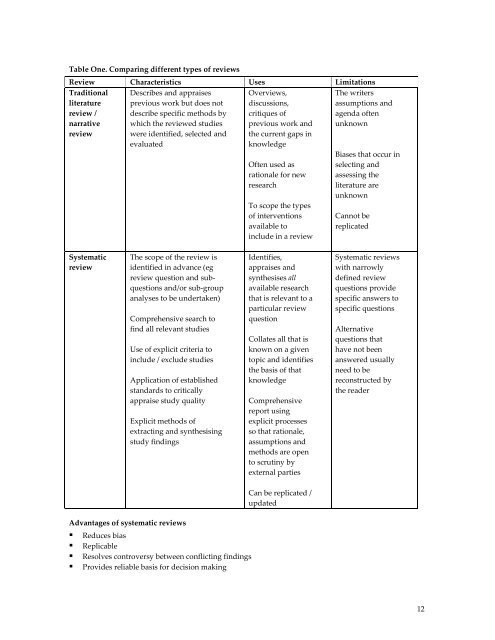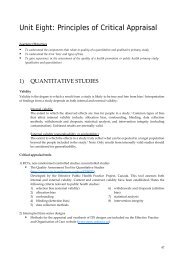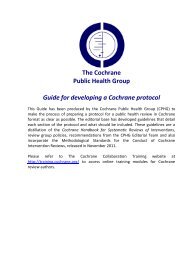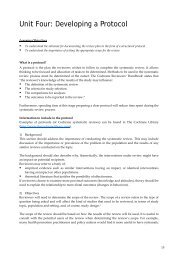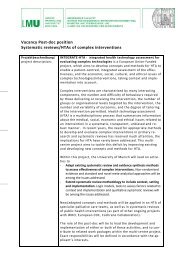Train the Trainer Course book - Cochrane Public Health Group
Train the Trainer Course book - Cochrane Public Health Group
Train the Trainer Course book - Cochrane Public Health Group
Create successful ePaper yourself
Turn your PDF publications into a flip-book with our unique Google optimized e-Paper software.
Table One. Comparing different types of reviews<br />
Review Characteristics Uses Limitations<br />
Traditional<br />
literature<br />
review /<br />
narrative<br />
review<br />
Describes and appraises<br />
previous work but does not<br />
describe specific methods by<br />
which <strong>the</strong> reviewed studies<br />
were identified, selected and<br />
evaluated<br />
Overviews,<br />
discussions,<br />
critiques of<br />
previous work and<br />
<strong>the</strong> current gaps in<br />
knowledge<br />
Often used as<br />
rationale for new<br />
research<br />
To scope <strong>the</strong> types<br />
of interventions<br />
available to<br />
include in a review<br />
The writers<br />
assumptions and<br />
agenda often<br />
unknown<br />
Biases that occur in<br />
selecting and<br />
assessing <strong>the</strong><br />
literature are<br />
unknown<br />
Cannot be<br />
replicated<br />
Systematic<br />
review<br />
The scope of <strong>the</strong> review is<br />
identified in advance (eg<br />
review question and subquestions<br />
and/or sub-group<br />
analyses to be undertaken)<br />
Comprehensive search to<br />
find all relevant studies<br />
Use of explicit criteria to<br />
include / exclude studies<br />
Application of established<br />
standards to critically<br />
appraise study quality<br />
Explicit methods of<br />
extracting and syn<strong>the</strong>sising<br />
study findings<br />
Identifies,<br />
appraises and<br />
syn<strong>the</strong>sises all<br />
available research<br />
that is relevant to a<br />
particular review<br />
question<br />
Collates all that is<br />
known on a given<br />
topic and identifies<br />
<strong>the</strong> basis of that<br />
knowledge<br />
Comprehensive<br />
report using<br />
explicit processes<br />
so that rationale,<br />
assumptions and<br />
methods are open<br />
to scrutiny by<br />
external parties<br />
Systematic reviews<br />
with narrowly<br />
defined review<br />
questions provide<br />
specific answers to<br />
specific questions<br />
Alternative<br />
questions that<br />
have not been<br />
answered usually<br />
need to be<br />
reconstructed by<br />
<strong>the</strong> reader<br />
Can be replicated /<br />
updated<br />
Advantages of systematic reviews<br />
Reduces bias<br />
Replicable<br />
Resolves controversy between conflicting findings<br />
Provides reliable basis for decision making<br />
12


